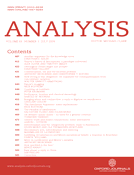-
Views
-
Cite
Cite
Maximilian De Gaynesford, Illocutionary acts, subordination and silencing, Analysis, Volume 69, Issue 3, July 2009, Pages 488–490, https://doi.org/10.1093/analys/anp068
Close - Share Icon Share
Extract
Claudia Bianchi defends what she calls ‘MacKinnon's claim’: that ‘works of pornography can be understood as illocutionary acts of subordinating women, or illocutionary acts of silencing women’ (2008: 310) in response to Saul (2006), and by appeal to the formulations of Langton (1993), Hornsby (1993, 2000) and Hornsby and Langton (1998). I think Bianchi has two different claims in mind (she may not disagree, despite use of the singular ‘claim’), and that it is important to distinguish the two, since the argument offered for either claim frustrates the aim sought by the other.
Bianchi expresses the first claim when she says ‘pornography is the subordination of women’, and that it subordinates ‘by conditioning people to regard women as willing sexual objects’ (2008: 310). Call this Subordination. She expresses the second claim when she says pornography ‘silences women’, and that it does so ‘by creating a communicative environment that deprives women of their illocutionary potential’ (2008: 310–11). Call this Silencing.




